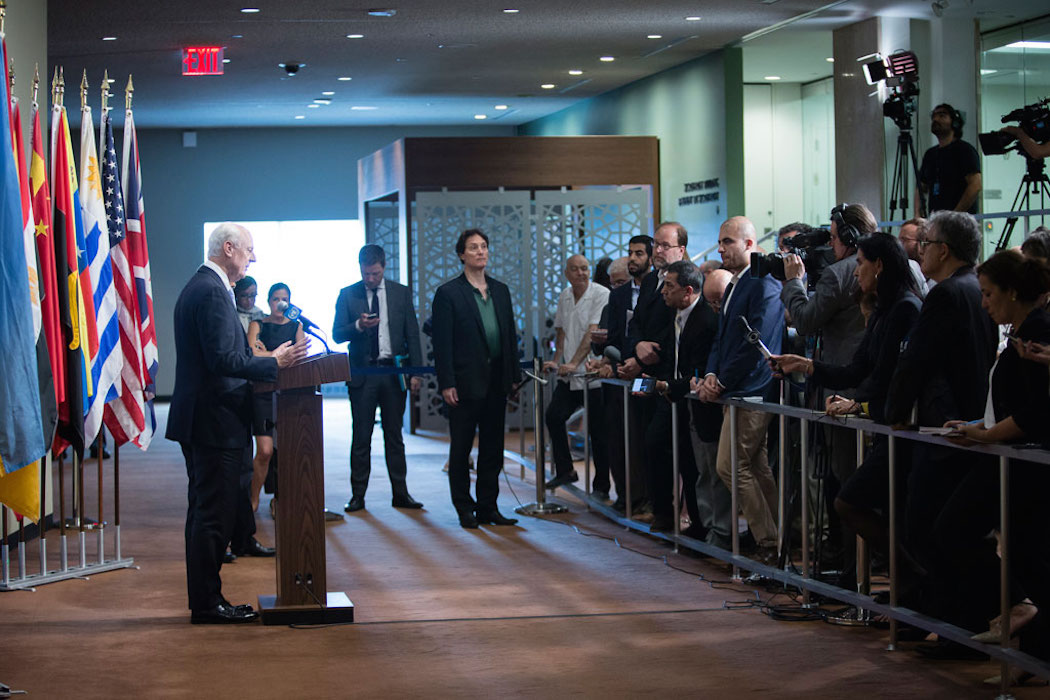The question echoing through the halls of the United Nations this week is if Staffan de Mistura, the UN Special Envoy for Syria is ready to quit his increasingly difficult position after yet another push back of Security Council talks on reaching a political transition in the war-torn country. Mr. de Mistura told the press after closed consultations with the Security Council yesterday that the upcoming intra-Syrian talks are to take place in August for execution in September and must be well prepared to make significant steps in Syria’s catastrophic situation.
“Bottom line, I’m still aiming – we are aiming at – within July, but not at any cost and not without guarantees,” the Special Envoy said. He added, “Everyone agrees that political transition is a priority and no one is denying it,” yet after the failure of the last two Security Council talks to produce legitimate plans for action, Mr. de Mistura urges all parties to be ready for cooperation. “In other words, we learned that when you convene a conference or talks or intra-Syrian talks, you want to make sure that it has good chances of success.”
Whether the August deadline is realistic or not, Mr. de Mistura’s predecessors do not have a good track record in moderating solutions in Syria. Both Lakhdar Brahimi and Kofi Annan, former UN Secretary General, resigned from their position as Special Envoy for Syria due to their inability to forge an impactful international response to Syria’s disastrous humanitarian crisis. Mr. de Mistura is only serving the UN, however, unlike his predecessors who also worked under the Arab League. This provides a little more hope for the Special Envoy given his decreased pressure from additionally mediating the League’s deep internal divisions.
With the world’s worst humanitarian crisis at stake, the pressure is on, and not only for the Special Envoy.
“Yes, I am putting pressure on all parties,” de Mistura told the press. “I think that the main parties who can make this happen need to feel that they have an historic responsibility,” he added. The Special Envoy stresses that the international community cannot sit on this political transition, but unfortunately de Mistura’s only leverage over the Security Council is his resignation.
“What we need is that the stakeholders do come with a feeling of urgency and work on some ideas on how to bridge their differences between what everyone means by political transition,” de Mistura told reporters.
On a more positive note, de Mistura reported that yesterday’s consultations addressed the news that humanitarian aid has finally reached the two remaining besieged areas out of 18 in Syria. Through crossline operations and airdrops, an inter-agency humanitarian convoy was able to deliver water, sanitation and hygiene items, and food, nutrition, education, health and emergency supplies to 20,000 Syrians in the besieged rural towns of Arbin and Zamalka in Damascus.
More than 941,000 people (354,000 in all besieged areas now) have been reached with humanitarian assistance since the beginning of 2016, some of them multiple times.
Despite this progress the Special Envoy said, “It’s quite a landmark. It’s not enough. We’re not reaching them as much as we want.” Hopefully Mr. de Mistura has what it takes to mediate the much-needed talks on Syria’s political transition. Otherwise, we might be seeing a tragic third resignation.












